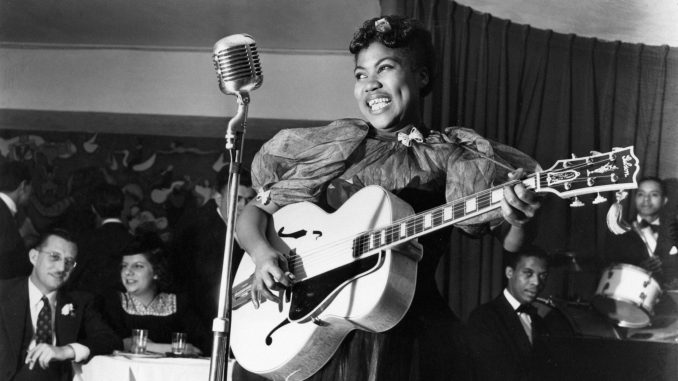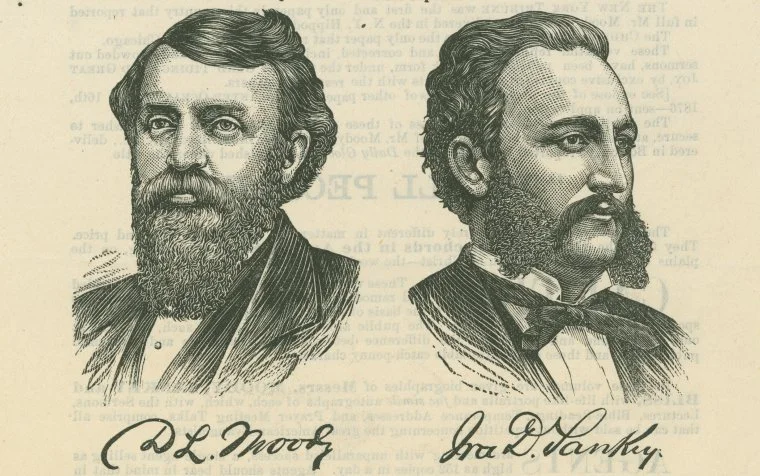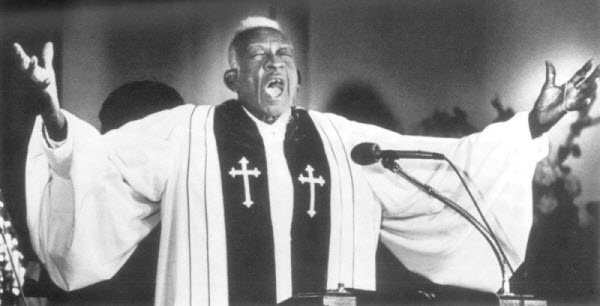By The Landlord
“Gospel music is nothing but singing of good tidings – spreading the good news. It will last as long as any music because it is sung straight from the human heart.” – Mahalia Jackson
"Plantation gospel music was the stuff I fell in love with when I was a kid - these beautiful melodies and these hard, hard stories." – Bobby Womack
"Gospel music is never pessimistic, it's never 'oh my god, its all going down the tubes', like the blues often is." – Brian Eno
"People love gospel music. It's calming. It's soothing. It gets right to the point of whatever you're dealing with." – Yolanda Adams
Impassioned, intense, joyful, searching, spiritually uplifting, led by strong, flamboyant individual voices, often backed by a recognisably sizeable, powerful choirs in harmony, echoing and enhancing, often with organ as well as other instruments from tambourines to guitars, never stately and sombre, but upbeat in rhythm and expression, gospel as we know it best known a musical style that came out of African-American churches of the American south. It can talk us and take us in with a story, it's declamatory, it's shouting out, mutually releasing, cathartic. It always looks upwards, seeking something often out of hardship, and doing so, in the sheer passion of this and emotional presence of others, finds, if not salvation or answers, at least moments of love and hope, and perhaps even ecstasy.
You don't have to be religious to feel its effect, and not all gospel is religious, but it can be ceremonial, celebratory, spiritual, and as a musical style it is one of the most influential - integral to the development of blues, rhythm and blues, realigning folk, and with so much talent coming out of the church, leading directly to soul, and seeping its benign path into all sorts of styles of pop, rock, hip hop, jazz, blues, traditional and even classical music.
So this week's topic is not gospel itself, but songs that display gospel's musical influence and elements. The subject matter need not be at all spiritual either, nor centre on the Holy Ghost, the Lord, hallelujah-ing, praising or seeking God's answer or redemption. Traditional hymns and canticles are also religious, and parallel to gospel in subject matter, but not influenced by it. And covers of gospel songs in other styles may contain a lyrical influence but are also less relevant because they don't echo gospel's style. So let's mainly concentrate on the musical side – songs that have the feeling of gospel rather than the lyrics.
So who are the prime influencers, not merely as leading lights in gospel, but also in taking into other music? Gospel is a wider term than the black evangelist church genre it is best known for. It goes back to the 17th century, where a cappella music in the black oral tradition interpreting or writing new hymns, with hand clapping or foot stomping to keep time. It became first published as a term in 1874, and in the 19th century prominent composers were often white and publishers were run by whites – they took control of black music, of course (history repeats itself again) - such as George F. Root, Philip Bliss, Charles H. Gabriel, William Howard Doane, and of course hymns by Fanny Crosby.
Moody and Sankey
But passion was still there in early white gospel. "Before I sing I must feel,” said American singer and composer Ira David Sankey (1840–1908), known as The Sweet Singer of Methodism, worked closely with evangelist Dwight L. Moody, performing to vast crowds in the US and abroad, including the Agricultural Hall in Islington, London, now the Business Design Centre.
Crowds at the Agricultural Hall in Islington, London, flock to hear the voice of David Sankey at the turn of the 19th-20th century
"Essentially the gospel songs are songs of testimony, persuasion, religious exhortation, or warning. Usually the chorus or refrain technique is found here." said Charles E. Gold, Charles E in his essay, The Gospel Song: Contemporary Opinion.
But for most people these people aren’t remembered as gospel pioneers, and while they have a place hymn history, the truly influential talents are those that emerged later, and elsewhere.
Gospel's big influential movers began in writing and performed in black churches from the 1920s onwards, particularly with radio spreading their sound: The Fairfield Four, the Dixie Hummingbirds, the Five Blind Boys of Mississippi, the Five Blind Boys of Alabama, The Soul Stirrers, the Swan Silvertones, the Charioteers, and the Golden Gate Quartet.
They had all been influenced by doing the jubilee style, harking back to the Fisk Jubilee Singers, a group of smartly dressed black singers by George L. White at Fisk University in 1871 to sing Negro spirituals. Their style was more formalised, restrained, with close harmonies, and a highly respectable look.
The Fisk Jubilee Singers
In parallel to black gospel there are various other sub genres - Southern progressive, blues gospel, Christian country, bluegrass gospel and contemporary, British and Celtic gospel. Perhaps the leading light of blues gospel was Reverend Gary Davis:
Davis was a huge influence on Bob Dylan, who recorded several of his songs, including Jesus Met The Woman At The Well. Tom Waits, and Ry Cooder must surely owe much to Davis too. Here's Ry on the entire musical style: "The thing I always found about gospel music was that it reached further into your being if you like, your mind. It takes hold of you - especially if you sing it and play it."
Thomas Dorsey on piano, playing with blues greats including Bessie Smith
Then in the 1930s came Thomas Dorsey, the man who changed everything. Dorsey played piano for blues greats Tampa Red, Ma Rainey and Bessie Smith, and in doing so, began composing and developing a style that combined the 16-bar blues structure with religious content.
Thomas Dorsey brought passion …
… and composition to gospel
A key element to this pioneer was his encouragement of emerging stars - for example Sister Rosetta Tharpe and Mahalia Jackson, the latter being one of his protégés - to express themselves individually, to show off their talent to the fullest degree, to sing loud and proud, the stretch out every line and syllable in glory and joy - very different to the strait-laced church styles of white culture – to encourage audiences to shout out too, and enhance the call-and-response technique with the choir. Looser, freer, it's as engaging as any music can be, and that's what gospel is at its heart.
Mahalia Jackson
So that's gospel for you, but who has it influenced, and how? The list is endless. The church upbringing, certainly to be found in many other performers who either started off in the gospel tradition. Reverend James Cleveland, taught Aretha Franklin to sing gospel, is regarded as the king of gospel, and there aren't many bigger singers coming out of gospel than the soaring power of Franklin, who must have been inspired by this:
One of the greats who also took gospel influences into secular music is Sam Cooke, who as a boy sang with The Highway QCs, but then really made an impact with The Soul Stirrers. The transition into soul was as smooth as his voice, and it's impossible to talk about this topic without mentioning a song associated with the civil rights movement and Martin Luther King.
The freedom of expression, and unfettered style of gospel can also be heard in others brought up in parallel churches - Jerry Lee Lewis, Elvis Presley, Hank Williams, and then on the soul side of things, those who converted gospel into their own form of soul – Ray Charles, James Brown, Clyde McPhatter and Roy Brown, Al Green, Marvin Gaye and Stevie Wonder to name but a few, through to R&B, whether that be Chaka Khan, Whitney Houston to Beyoncé. A great rare book on the emergence of soul, of which this week's guru (see below) is an owner, is Soul Power:
Gospel to .. Soul Power
But where this topic becomes even more fascinating is how gospel can be found in artists you wouldn't necessarily associate with it. Rock and indie bands, from the Stones to the Kooks for example, have used gospel choirs on their own songs. Hip hop stars from Chance The Rapper to Frank Ocean and Kanye West are infused with gospel influences and samples. Some songs by reserved, quiet delivery of Leonard Cohen even has musical phrasing and expression that comes directly from the gospel church. And the experimental artist Bon Iver is one of many who has sampled gospel music, such as that of Mahalia Jackson. Gospel is everywhere. For reference and more inspiration you may also enjoy referring back to a previous topic of sacred and spiritual songs, from which these playlists were created. Naturally though, this topic is more likely to be secular, as explained above.
So the, over to you, learned congregation of music scholars, to explore this topic and put forward your gospel infused songs in comments below. This week's soul brother and marvellous minister of music and is our very own magicman. Praise be! Deadline for nominations is this Monday at 11pm UK time, for playlists published on Wednesday. Amen to that!
New to comment? It is quick and easy. You just need to login to Disqus once. All is explained i in About/FAQs ...
Fancy a turn behind the pumps at The Song Bar? Care to choose a playlist from songs nominated and write something about it? Then feel free to contact The Song Bar here, or try the usual email address. Also please follow us social media: Song Bar Twitter, Song Bar Facebook. Song Bar YouTube. Subscribe, follow and share.









